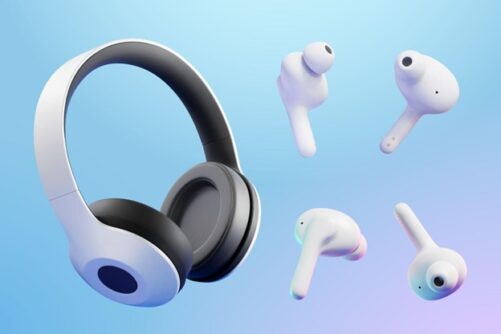Nothing is more frustrating than trying to listen to your favorite podcast or best playlist with a weird buzzing noise in your headphones.
Static noise and buzzing sounds in headphones are common issues with several possible causes.
If you’re dealing with this unpleasant noise, you may be able to fix the problem with one of the solutions below! You can also learn a few tips for preventing this annoying noise.
Reasons Your Headphones Are Buzzing

Before finding the right solution, you must determine why your headphones create this buzzing or static sound. Consider the possible causes below and which may apply to your device.
Audio Settings
The most common cause of buzzing or static in headphones is incorrect audio settings, which usually means your audio settings are too high.
With any type of speaker, from home speakers to car speakers to AirPods, playing audio too loud or increasing bass can result in static noise. And if you play audio too loud for too long, you may blow your speakers, damaging them irreparably.
Wire Issues
If wires on your headphones are old or damaged, this will almost always cause static noise. Any wires with frayed connections, bent cords, or loose ends will likely result in poor sound quality and static noise. Inspect your wires for any of these problems when fixing your headphones.
Auxiliary Port Issues
A similar issue to damaged wires is auxiliary port damage or malfunction. If the audio port on your playback device or the headphones is dirty, rusted, or damaged, it will cause a buzzing sound in your headphones.
You may notice a funky static noise when you plug your headphones into a playback device. This unpleasant noise can be an indication of an auxiliary port that needs attention or replacement. Auxiliary port issues can stem from normal wear and tear, rough use, or exposure to moisture. These ports are metal, so any moisture will cause them to malfunction.
Damaged Speakers
There is always the possibility that your headphone speakers are damaged. A hardware issue can cause static, whether it’s an internal issue or the speaker perforations are clogged with dirt, dust, and debris.
A pair of damaged headphone speakers is one of the worst scenarios, as it often means you need new headphones. But there are some troubleshooting tricks you can try!
Interference
If your headphones are wireless, they may pick up audio signals from nearby devices. Some wireless headphones do this, like how a radio station picks up multiple signals simultaneously. It’s more common than people think.
Imagine all your Bluetooth devices fighting for your headphones’ attention! Other objects can also cause interference resulting in static, like a metal door or wall.
Outdated Audio Driver
If you’re using a computer to play audio through your headphones, your device may have an outdated audio driver. Audio drivers must be updated frequently to ensure top sound quality. Whether you use Windows, macOS, or any other system, your audio driver will need periodic updates, which typically come with software updates.
How to Fix Your Headphones

Follow the instructions below to fix your particular problem, or you can try all these troubleshooting tips if you aren’t sure what is wrong with your headphones.
Adjust Audio Settings
Adjusting your audio settings can be as simple as keeping your audio volume below a certain level. Despite what you may think, it is unhealthy to blast your music at the highest volume, even if your headset allows it. You can adjust the audio panel if your playback device is a computer.
Turn off audio enhancements, lower bass, and lower treble, and try using your headphones again. All computer audio systems will be different, but disabling extra features and lowering the settings can help reduce buzzing noises. If you previously messed with your audio settings, resetting them to factory or default levels can be a decent place to start.
Troubleshoot Hardware
As mentioned, troubleshooting hardware issues can be intimidating and challenging.
If you’re uncomfortable with technology this way, it’s best not to take apart your headphones, as you may only worsen the problem. But you can do a few simple things, such as clean your auxiliary ports with a microfiber cloth and secure your wires.
If your wires are damaged, they should be replaced, but this can be hard if you don’t know what you’re doing. If you notice a loose or frayed wire, you can always try to patch it up with electrical tape, but this is not a long-term solution. You should consult a tech expert or replace your headphones if you suspect hardware issues.
Eliminate Interference
For wireless headphones, try eliminating all interference and see if this stops the buzzing sound. Ensure your playback device is close to your headset and there are no obstructions, such as a wall, door, or desk.
If this doesn’t change anything, turn off all Bluetooth devices nearby. This should solve the issue if your wireless headset picks up other audio, causing static.
Update Your Audio Driver
For most people, audio drivers update automatically or occur along with general software updates. But if you tried everything else and the unwanted noise is still there, check your audio driver on your computer.
If it needs an update, that is likely your problem and should eliminate the buzzing sound. Updating your driver can be confusing, but you can use a program like Driver Easy to help you.
When to Replace Your Headphones
So when should you throw in the towel on your headphones?
Call the brand’s customer service team if you try all the solutions above, and the buzzing sound persists. You may get the headphones replaced under warranty. Otherwise, it’s probably time to buy a new pair of headphones.
Tips for Preventing Static in Your Headphones
To prevent this issue in the future, below are a few tips and recommendations for headphone care.
Frequently Check for Software Updates
If you use the same playback device, like your phone or computer, ensure you keep all your software up to date. This also includes audio applications, like a music app or podcast app, so keep these up-to-date and check for updates if you don’t have them set to occur automatically. However, automatic updates can be super helpful and convenient!
Keep Them Clean
The number one way to prevent headphone static and other headset issues is to keep your device clean and pristine.
You can purchase a headphone cleaning kit with everything you need to remove stubborn dirt and debris. Or you can use household items like paper clips, Q-tips, microfiber cloths, moist wipes, and tissues. It’s ideal to clean your headphones after or before every use, but cleaning them once a week is still excellent.
Protect and Monitor Wires
The longer a wire is loose or, the more it frays, the harder it will be to fix. Regularly inspect your headphone wires and make sure there is no damage.
Fixing a wire that just started coming loose is easy, but a wire hanging on by a thread is harder to salvage. You can also buy wire covers or use electrical tape preemptively to prevent frays or loose ends.
Be Gentle With Your Headphones
Above all, be gentle with your headphones. Technology has come a long way, and modern headphones are more durable than ever. But they are far from indestructible, so treat them with love!
The Bottom Line
Hopefully, one of these solutions will do the trick, and you won’t have to go shopping for new headphones (although it can be a fun process).
Either way, keep these preventative tips in mind to avoid the frustrating static noise or buzzing sound in the future.
FAQs
Below are a few frequently asked questions concerning this topic.
Why are my headphones buzzing in one ear?
A buzzing sound in one ear likely means that the side of your headphones is damaged or dirty, so check the wires and clean that side of your headset.
Why do my headphones buzz when I’m using a gaming console?
Like on a computer, you can adjust the audio settings on your gaming console.
